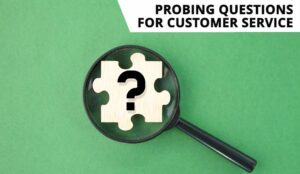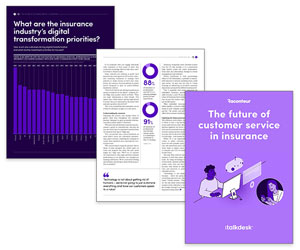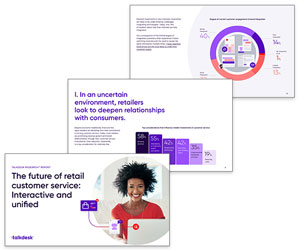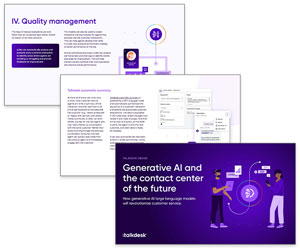Paul Cooper gives us his opinion of the top 10 questions for customer service.
As I travel all over the country and overseas, I see an enormous amount of interest in customer service.
People everywhere, at all levels in organisations, clearly want to improve what they do for themselves, their colleagues, their organisations and their customers.
As a result, I am often asked what are the key issues in customer service today.
So I thought that I would put together the top questions that I seem to get asked everywhere, and see if we can start a debate, as I’m going to give you my answers too!
1. Of course, I believe in all this service excellence stuff, but how do I convince my bosses/board?
Easily number one and I guess a symptom of the modern business world. I tell people to start trying to make a difference themselves to prove the case, especially the point that giving great service usually costs less than giving poor service, if you measure it right.
Even bosses can be convinced occasionally by facts and an overwhelming business case, and this is being supported more and more by research. In the end, though, a good and believable link to ROI is getting easier and easier to prove.
2. How do I reduce my headcount turnover?
I believe that this is a combination of the right recruitment practices, induction, training and culture, especially when the staff feel involved in operations.
We also have a rapidly growing body of evidence that organisations that are actively developing their people using qualifications like NVQs are seeing reduced headcount turnover as one of the early, significant organisational benefits, along with increased employee satisfaction.
3. How can I get my complaints down?
By stopping asking the wrong question! In the initial stages, it’s not a matter of getting them down but
- ensuring that you are hearing about all of them
- resolving brilliantly the ones you get
- stopping them being repeated, and
- learning lessons and passing these on to others.
This might even lead to a short-term increase in complaints, but this is artificial – you always had them but didn’t know about it. In the long term, complaints will probably go down, but as long as every new one is different to the old ones, what does it matter? You’re still learning.
4. Is a contact centre/CRM system/outsourcing/offshoring a benefit to improving customer service?
The classic yes and no answer. If any of these things is being done/introduced PRIMARILY to reduce costs, then I would doubt whether real improvements in service levels will be gained, especially in the long term.
If they are to be considered as an integral part of a strategy which is about improving customer service, one or more of them could be useful. There are NO quick fixes in improving customer service, but there can be some quick wins. The main factor is to never outsource what you don’t fully understand, just because you can, as you’ll then never be able to monitor your provider’s performance properly.
I would close with one key cautionary note to anyone. Make sure you are really comfortable with the answer to this question – Does it REALLY make sense for you to lose some or all of your control over your most important long-term asset – your customers?
5. Why isn’t my CRM system working to my and my people’s satisfaction?
Join the huge number of organisations that apparently are still saying this. In my opinion, it is likely to be the result of two basic things.
Firstly, the whole thing was put in place with little or no reference to the people who would be using it – the front-line professionals in customer service, sales etc., who know what they actually need.
Secondly, you have mixed up the importance of the words in the phrase CRM. Customers don’t want to be managed, but they are usually perfectly happy to have a relationship with you. Put the emphasis in the process on building long-term relationships with the customer rather than trying to manage them.
6. How can I maintain a long-term service excellence strategy when every 5 minutes the organisation introduces its latest change programme?
Firstly, get used to it, it’s always going to be that way. Secondly, be an active advocate that any change must presumably be to make the organisation more profitable, and we all know that this comes from improved service excellence and reputation.
The only way to get this is to be more customer-centric and so this must be core to the change programme. QED.
7. Why isn’t customer service as good in the UK as it is in the USA and Australia?
You know, in many cases it is. It’s just a problem of perception. If we have one bad experience with a contact centre, suddenly all contact centres, and the whole process, are awful. The UK has as many great organisations, in many sectors, who are as good as anywhere in the world. In the USA, the whole service thing is often money driven – I’ll give good service because I’m expecting a massive tip from you.
I accept that in some stores, hotels, etc. in the UK there is a poor staff attitude to serving the customer. But I don’t think it is endemic. The reasons are usually the same across the board – they are hiring the wrong people – often part-time, short-term cover – not training them, and not trusting them.
What else do they expect? A true customer service professional in the UK, trained and recognised for what they are, is as good as, or better than, their equivalent anywhere in the world. It’s an attitude of mind, and pride.
8 We’re in the public sector/a monopoly – why should we have to care about giving good service?
Aren’t you a customer, too? What if it was your mum? Don’t you have any pride in your work? Do you want to work for an organisation that has a bad reputation? Why would you get up in the morning?
Customers now compare you with other organisations in your area, regardless of sector – how do you perform? How long have you got? I’ve got hundreds of reasons!
It should also be noted that, in many sectors, especially the public sector, both government requirements on re-organisation/re-structuring and regulators’ involvement is also making a customer-centric approach pretty much compulsory, or some may be re-structured out of existence. Not the best method of persuasion, perhaps, but a reality.
9. Can you give me a definition of customer service – what does it look like?
Customer service is the sum total of what an organisation does to meet customer expectations and produce customer satisfaction.
Customer satisfaction is the feeling that a customer gets when he/she is happy with the customer service that has been provided.
Customer expectations are what people think should happen and how they think they should be treated when asking for or receiving customer service.
10. Should I be doing any benchmarking, and will it help?

Another yes and no, but mainly yes. Comparing yourself with the best is a good way to learn how to improve, as long as you get the whole story, not just a perception of it.
Learning from other sectors can often be much more beneficial than same-sector comparisons, as you may all be doing it wrong, and one can see new ways of approaching issues and problems.
Measuring and comparing the same things over time is much better than just a one-off view/comparison, as trends can be observed and learned from. Remember, all of you in the private sector – there are a lot of excellent things nowadays coming out of the public sector – tap into it and get good ideas that might work.
Paul A Cooper is a Director of Customer Plus
Are there any questions that Paul has missed? Leave your comments in an email to Call Centre Helper
Author: Jo Robinson
Published On: 29th Jun 2011 - Last modified: 20th Jun 2017
Read more about - Customer Service Strategy, Customer Service, Top 10







































Paul Cooper’s 10 questions are a great tool for any organization. For me, the definition of customer service should be based on how the customer feels immediately after the transaction. If the customer leaves with the thought “hey, I can’t wait until I do business with this company again”…then the company has achieved it’s goal that every business wants…repeat business. Richard Shapiro, The Center For Client Retention
I believe it would be useful to mention how Workforce Management (WFM) may be used to address some of these questions.
1) Service excellence is partly and often, largely, a function of precisely aligning “supply” (agents with the appropriate skill sets, etc.) with demand (calls, emails, etc.) and according to the desired service level. This is predicated on having accurate forecasts of such demand based on (weighted) historical data and planning for known conditions in advance and, where necessary, reforecasting should the unexpected occur. A good WFM solution will readily facilitate this.
2) Turnover may be significantly reduced where (per 1 above) there is a good fit between supply and demand – ensuring such fit means that agents will neither be rushed off their feet nor bored, twiddling their thumbs waiting for the next call; both situations result in increased stress which increases the likelihood of agent attrition issues. Furthermore, other agent benefits are likely/possible, e.g. fairer allocation of shifts and holidays, the ability to perform shift swaps/implement split shifts and part time and other flexible working practices, and general employee empowerment. A good WFM solution will readily facilitate all of these but, it is crucial that employees’ “hearts and minds” are won over prior, during and after implementation.
3) Complaints will reduce if there is a better fit of agents/skills with demand. A good WFM solution will readily facilitate this.
4) WFM is equally applicable to in-house and outsourced contact centres.
5) A bad or poorly implemented WFM solution may be akin to a bad CRM system. It’s not just the technology, either, it’s the people and processes too – sadly, the latter are often overlooked.
6) A good WFM solution (combined with the expertise of resource planners and buy-in of others using or affected by it) helps an organisation to maintain a long-term service excellence strategy. Good WFM facilitates forward planning through “what-if” analysis and may be used to scientifically evaluate and validate assumptions.
7) Indeed, good customer service is probably not determined by the country BUT it is highly likely to be a function of having a good WFM solution in place. Without WFM there is necessarily a reliance on spreadsheets (best case), “doing what we did before” (plus or minus x%) or pure guess work (worst case). Without accurate and dynamic forecasts, capacity planning and scheduling, delivering the desired service level is well-nigh impossible.
8) Good WFM helps public sector organisations deliver their customer service targets without them having to resort unknowingly to over-staffing and, in these troubled economic times, significantly reduces costs without the organisations necessarily having to resort to ill-advised and savage job cuts.
9) Customer service is also about having the right people with the right skills doing the right things at the right times – an often cited definition of WFM.
10) Good WFM can enable an organisation to scientifically benchmark internally and provide data to enable it to do so externally too.
Keir Woolhouse
Managing Director, GMT Europe Ltd.